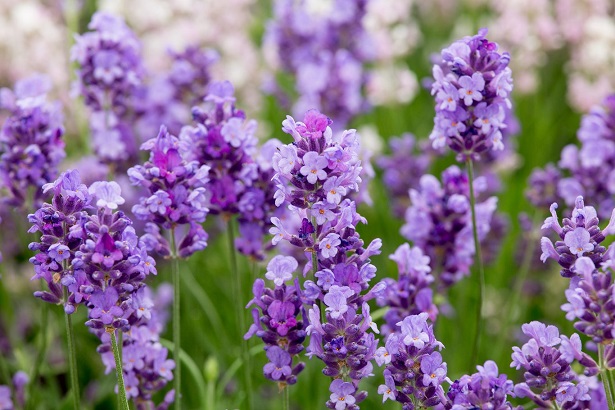Nikhil Prasad Fact checked by:Thailand Medical News Team Nov 18, 2025 2 months, 4 weeks, 8 hours, 44 minutes ago
Medical News: A new scientific study has revealed that extracts from the common Mediterranean lavender plant Lavandula stoechas may possess powerful and highly selective cancer-fighting properties. Researchers from the Department of Medical Biology at Recep Tayyip Erdoğan University in Türkiye conducted an in-depth evaluation of fresh and dried plant extracts to see how they affect cancer cells compared to healthy cells.
 Researchers report that fresh lavender extracts selectively kill cancer cells while sparing healthy tissue, pointing
Researchers report that fresh lavender extracts selectively kill cancer cells while sparing healthy tissue, pointing
to promising future therapies. Image Credit: Paul Debois / BBC’s Gardener’s World Magazine
Their findings offer fresh hope for developing safer, plant-based anticancer treatments that harm cancer cells while leaving normal tissues mostly unharmed. This
Medical News report explores what the scientists discovered and why it matters.
Fresh Lavender Extract Shows the Most Selective Power
The research team compared four different extracts prepared with ethanol or methanol. These were tested against breast cancer, bladder cancer, and aggressive glioblastoma cells, along with healthy fibroblast and retinal cells to measure safety. Fresh-plant ethanol extract, known as LsFE, stood out as the most effective and most selective of all samples. It sharply reduced the growth of cancer cells—especially breast cancer (MDA-MB-231) and glioblastoma (T98G)—while having much weaker effects on normal human cells. This strong selectivity is important because most current chemotherapy drugs damage healthy tissues, causing major side effects. The study found that dried-plant ethanol extracts (LsDE) were also toxic to cancer cells but caused greater harm to non-cancerous cells, making them less ideal.
How the Extract Works Inside Cells
To understand why the fresh extract was more effective, the researchers examined the cell nuclei after exposure. They observed that cancer cells rapidly lost their structure and viability after treatment, especially after 48 hours. Healthy cells, however, survived at much higher rates. Viability tests confirmed the same pattern: cancer cells dropped to below 30 percent survival with LsFE, while healthy cell survival stayed above 60 percent. The study highlights that the difference between fresh and dried extracts may be caused by changes in key plant compounds that occur during drying.
Powerful Natural Compounds Identified in the Extract
Using advanced LC–QTOF–MS chemical analysis, the scientists identified several natural molecules in the lavender extracts that may contribute to the anticancer effects. These included phenolics such as tyrosol and 3,4-dihydroxybenzoic acid, sesquiterpenoids like Kikkanol A, jasmonate-related molecules, flavonoids, oxidized fatty acids, and ionone derivatives.
Many of these compounds are already known in scientific literature for their antioxidant, anti-inflammatory, and cell-protective properties. Importantly, many were found at higher levels in th
e fresh-plant ethanol extract, offering a scientific explanation for its superior cancer-targeting ability.
Why These Findings Matter
The study suggests that Lavandula stoechas, a plant widely found across Mediterranean regions and traditionally used in folk medicine, may contain compounds capable of selectively attacking cancer cells. The discovery that the fresh-plant extract performs significantly better emphasizes the need to carefully consider harvesting and processing methods in herbal-based drug development. Because the extract spared non-cancerous cells, it may offer a gentler treatment option in the future compared to many modern chemotherapies. While more research—including animal and human studies—is needed, these findings open the door to exploring lavender-based anticancer therapies.
Conclusion
The study shows that fresh ethanol extracts of Lavandula stoechas possess strong and selective anticancer activity, driven by a rich mix of phenolics, terpenoids, jasmonates, and oxidized fatty acids. This selective effect—killing cancer cells while minimizing damage to normal cells—makes LsFE a promising candidate for future drug development. The results also highlight that plant processing methods greatly influence medicinal effectiveness. Further work is needed to isolate individual active compounds, understand their mechanisms, and evaluate their safety in living organisms. With deeper investigation, this humble lavender species could one day contribute to safer, plant-based cancer treatments.
The study findings were published in the peer reviewed journal: Pharmaceuticals.
https://www.mdpi.com/1424-8247/18/11/1706
For the latest on Herbs and Phytochemicals, keep on logging to Thailand
Medical News.
Read Also:
https://www.thailandmedical.news/articles/herbs-and-phytochemicals
